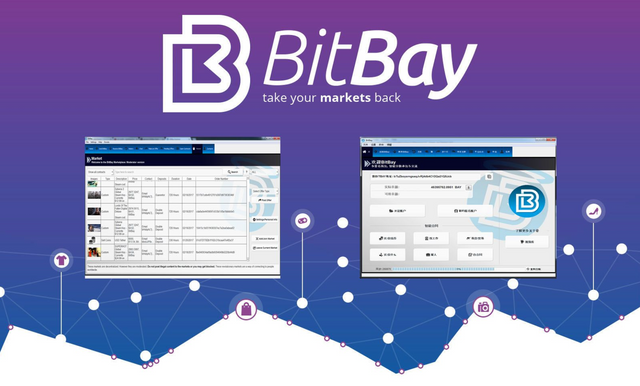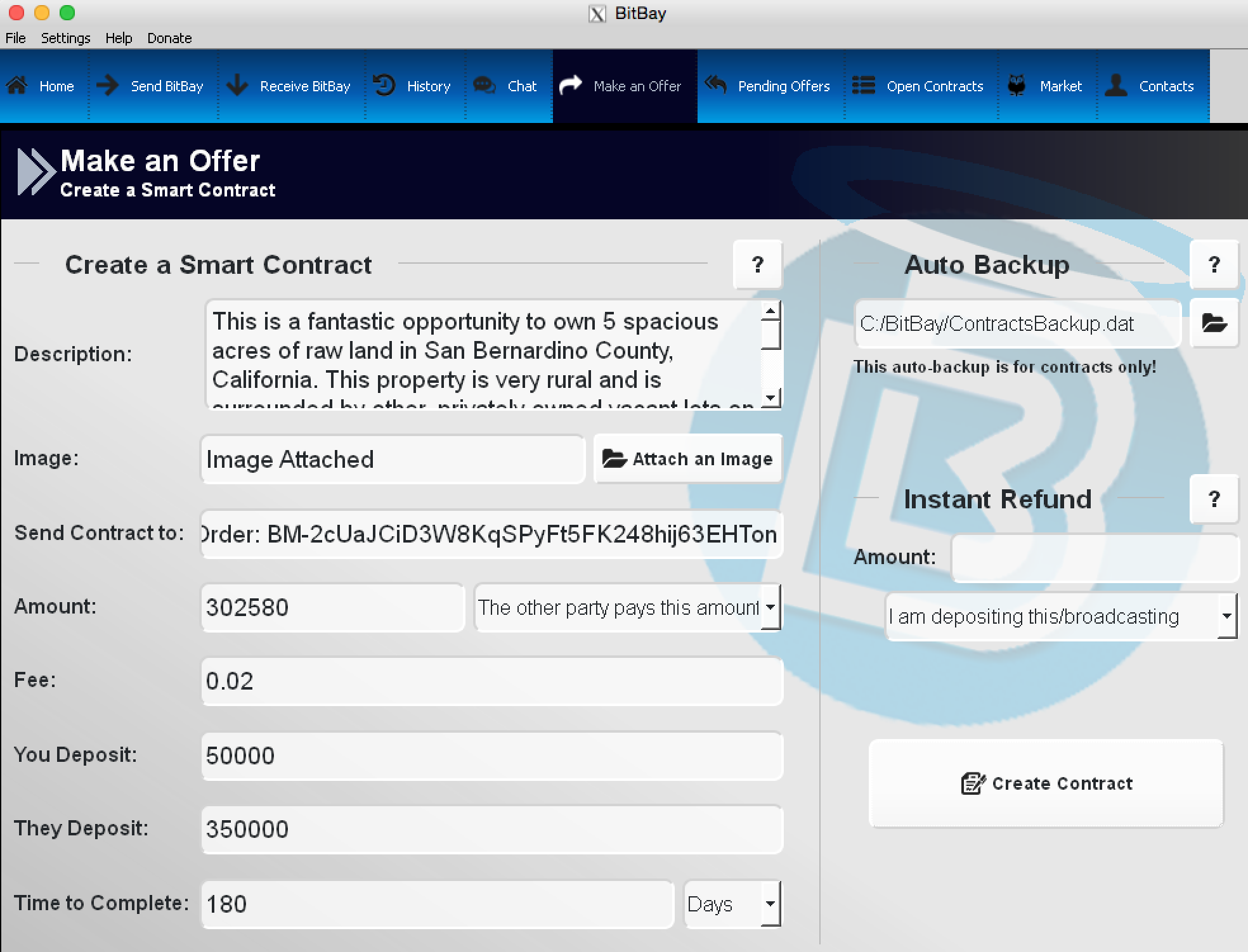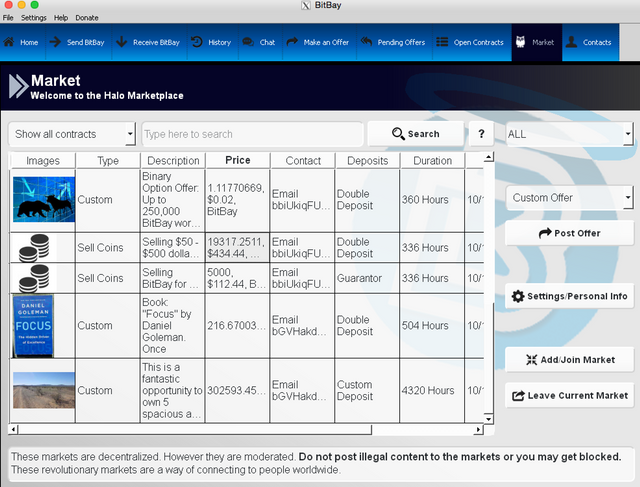How I sold 5 acres of land using BitBay’s trustless smart-contracts:

Have you ever wondered why there are so many hoops to jump through when purchasing or selling high-value items? Have you ever bought a house and wondered why you have to sign heaps of paperwork and sometimes wait months for a transaction to close?
In essence, it all boils down to two things:
- The involvement of middlemen (banks, real estate agents, title companies, escrow agents, attorneys etc.)
- A lack of trust between two parties.
Fortunately, there’s another, vastly improved process evolving as we speak. It’s called trustless smart contracts. With BitBay, I was able to easily create a custom trustless smart contract, which enabled me to sell a 5-acre property located in Southern California, to an international buyer located halfway across the world in Norway.
This was all done with a peace of mind and without hassle.
Now, before we get into this…. the words and ideas in this article are solely based on my own opinion and experiences. I am not an affiliate of BitBay, and these opinions are not a reflection of any organization or entity. I’m only here to express my personal approach to real estate transactions and how I would like to see the industry change in a sustainable way. Closing real estate transactions using crypto-currency is still relatively new, and can carry substantial risk. Government regulation, accuracy of information, and volatile currency rates can all change overnight, which can either make or break the deal. BitBay is one of the few platforms out there changing this right now.
Also, I understand that many of the middlemen and systems within the real estate industry have originally been designed for a purpose… to ensure strict legal security and structure for all transactions. I believe this purpose is a good thing… However, I also see how these outdated systems can cause a blockage in the flow of both information and money from both the buyer and the seller, while charging high fees in the process. In an age where consumers can order almost anything online and have it delivered in a day or two, why does it have to take weeks or months to buy land or a house?
So what is BitBay you might ask?
From their website: “BitBay is a working real-world cryptocurrency powering a fully-functional decentralized marketplace that allows you to buy and sell goods and services easily, securely, and anonymously.”

I first discovered BitBay markets while perusing forums on cryptocurrency investing, and after reading several recommendations, decided to give it a look. After checking out their project, I decided to buy come BAY currency, thinking I would hold it long term and nothing more. However, upon realizing that their client had a built in wallet, I went a bit further to download it in order to securely store the coins. In all honesty, my first impression of the BitBay client was fairly unimpressive. The general feel of the user interface seemed a little outdated, and had a strong “Windows ‘95” feel to it. However, after watching a few tutorial videos (which I highly recommend) I quickly realized that this is a very powerful tool, which can be used for almost any type of transaction in the world. David Zimbeck, the developer and his team have spent almost 100% of their focus on the function and security of the software, before making it visually appealing. Function before fashion, I absolutely love it.
(note: A brand new, more visually appealing user interface is going to be launched Q1, 2018)
After a few days had passed, I was really curious to see the software in action. I wanted to see if these “trustless smart contracts” were actually a legitimate process for business, and the only way to do that was to list something on their decentralized marketplace. In order to truly test this out, I needed to sell something large, something that would normally require a sizable amount of trust; an item that typically included middlemen, central authorities, and high fees. It so happened that I had a 5-acre parcel of land I needed to sell, which would be perfect for this experiment.
That afternoon, I sat down with a cup of tea at my desk, thinking that creating this market listing would take the rest of the day. However after few clicks, I had my property listing up on the decentralized marketplace. The most time consuming part for me was deciding how to tailor the double deposit escrow (DDE). The way this trustless system works is that both buyer and seller deposit a set amount of money into an encrypted account. If either party decides to cheat one another, the deposits are destroyed, and both lose money. This conveniently prevents fraud, as there is no financial or physical gain for dishonesty. Additionally, this also completely eliminates the need for a costly third-party escrow service. The double deposit escrow can be set up a number of different ways, depending on the seller’s risk tolerance and value of the item being sold.

After a few days of having the land listed on the marketplace, I opened my computer to find that someone had accepted my smart contract. Not only that, but it was a buyer located on the other side of the planet, in Norway! My first thought was “Is this even legal?” However, what I really found surprisingly surreal was the feeling of trust that came with this contract acceptance. I had comfort knowing that the deal would be followed through to completion. (note: BitBay offers automatic price tracking, so if the currency value changes before a contract is accepted, you will still receive the equivalent amount for the deal. You can also use fiat for the purchase price and BAY for the deposit to ensure minimal price change upon contract completion. The rolling peg will also create an incentive to use BAY instead of fiat.)

Once I confirmed the legality of foreign citizens purchasing real estate in the U.S., I mailed the deed and paperwork out to the buyer. This was the slowest part of the transaction. The county that this property is located in requires a “wet signature” on all recorded documents, so an electronic signature was out of the picture. Once the buyer signed the documents, he then had to send them back to the U.S. for recording. Someday, when the counties update their policy, e-signatures will make the process incredibly faster. To take it one step further, imagine if the counties could integrate their records onto the blockchain… Then an accepted smart contract on BitBay could seamlessly be updated in the county records. (These countries are already looking into it). I digress. Once the county received and recorded the deed, the buyer then sent the payment of BAY currency to my BitBay wallet address within the client. At that time we both received our deposits back, and the transaction was complete.
Over all, this transaction was about as smooth as I could have ever hoped. With the custom smart contract templates, the possibilities are infinite. The only frustration I experienced was where the ultra-efficiency of BitBay met the clumsiness of the county’s recording system. I can also see how there would be other roadblocks with various real estate industry middlemen (i.e. title companies) that have not adapted to advancement in technology. I look forward to seeing all components of real estate transactions placed onto the blockchain in the future. One other aspect that I could see posing an issue is government regulation. The US federal government currently classifies cryptocurrency as property, requiring citizens to pay capital gains taxes on both cryptocurrency and real estate. In my case, if I were to convert the profits from my land sale to US Dollars, I could be potentially taxed (15–20%) for both the sale of the land and the “conversion of currencies”. If this changes, transactions like this will be much simpler and more cost effective to complete. Until then, I will continue to hold and use this amazing platform called BitBay.
If you’re curious, here are several of the many features that make it so unique:
Double Deposit Escrow — both parties have to put money in the deal, and if anyone backs out, both parties lose. This creates a synergistic relationship between both sides, and automates enforceability of the contract.
Dynamic Rolling Peg — The automated control of supply and demand. This keeps the currency stable, so users don’t have to worry about huge market fluctuations during transactions. For a better understanding check this out.
(This will be implemented in Q2, 2018)
Built-in wallet to the client — This is a very secure wallet, which interacts perfectly with the marketplace. There is the option for staking as well.
(Web wallet is soon to be released)
Custom Smart Contract Templates — This is huge, because it allows you to easily create your own transaction. You can use literally any currency, or none at all. You can barter…you can trade…all anonymously and safely knowing that the other party will fulfill their end of the bargain. The possibilities are endless!
Also, here’s what they have in the works for this next year:

Congratulations @tradersnow! You have received a personal award!
Click on the badge to view your Board of Honor.
Do not miss the last post from @steemitboard:
Congratulations @tradersnow! You received a personal award!
You can view your badges on your Steem Board and compare to others on the Steem Ranking
Do not miss the last post from @steemitboard:
Vote for @Steemitboard as a witness to get one more award and increased upvotes!